Projects: Ireland has Struck Oil, 2017
All our tomorrows: Ireland has struck oil! – will be it Norway or Nigeria?
Ireland has struck oil – but will be it Norway or Nigeria? was a performance project from The Fence network of international playwrights and theatre makers in partnership with King’s College’s Arts and Humanities Festival: World Service, with Professor Max Saunders. It staged and audio recorded performance and discussion for a live audience on an imagined future scenario, mapping a moment of crisis in Europe from creative, journalistic and academic perspectives.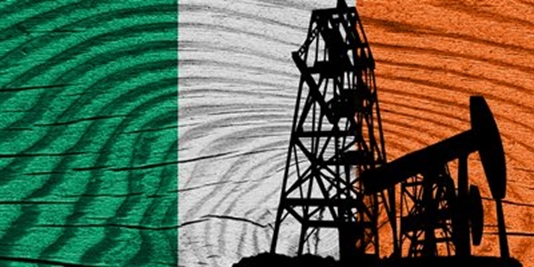
This performance explored the urgent questions thrown up by Ireland’s reversal of fortunes and its new oil-rich future, particularly in relation to its Celtic Tiger past and the fall-out from the Credit Crunch, but also in relation to big brother – the British state and its expertise in matters of oil… Where and what are the borders between Irish and British interests? What does Ireland imagine for itself? What can be learnt from experience in Nigeria and in Norway with the challenges of oil?
As the first of the All Our Tomorrows series of live performance and audio recordings, this event was developed by Irish-Nigerian playwright Gabriel Gbadamosi as creative editor with a professional radio producer and cross disciplinary academics as pundits. It was produced on behalf of The Fence network of international playwrights and cultural operators by Jonathan Meth. Also featuring Neil Fleming and Peter Arnott.
Let me with the help of a few photographs from the evening, try and paint you the picture.
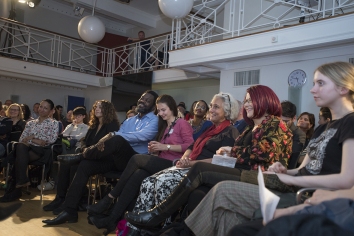 Student ambassadors strike up conversations with arriving audience members about Ireland striking it oil rich. Up to the 6th floor we go in a lift marked To the Near Future, we are then invited into a traditional, steep raked lecture theatre, where the downstage presentation area has been converted in to a Pop-up Guinness bar.
Student ambassadors strike up conversations with arriving audience members about Ireland striking it oil rich. Up to the 6th floor we go in a lift marked To the Near Future, we are then invited into a traditional, steep raked lecture theatre, where the downstage presentation area has been converted in to a Pop-up Guinness bar.
The giant pull down projector screen is showing a film by Northern Irish artist Jonathan Armour of oil - its textures, patterns and movements.
The 3-piece Quiery Brothers are playing traditional sounding Irish tunes from the middle of the lecture theatre (some of these are in fact related to Bobby Sands – some people will recognize these as such, others will not).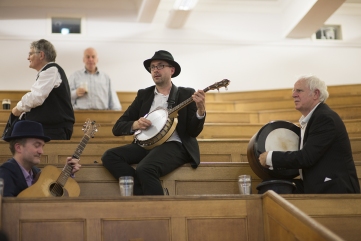
Out of the assembling audience and their hubbub Writer, Performer and stand-up comedienne Tara Flynn pops up to give us a 15 minute monologue on where she was when she heard Ireland had struck oil - and what struck her about it.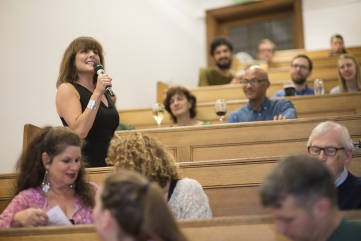
This sets the tone for the evening playful: serious but comic.
While the audience refills their glasses, we are then ushered through into the Anatomy Museum. As we take our formally-arranged seats, we encounter 3 Jonathan Armour art works, in plexiglass, acrylic and onscreen variously presenting the naked male body anatomised in forms akin to the map of Ireland. The body politic, if you will. A Radio sound recordist explains to the audience that we are to be part of a radio recording and that certain protocols will therefore need to be observed. Author and World Service Producer Colin Grant oversees the audio recording, for future podcasting of the event.
Hosted by Dubliner, Emma Dabiri (a Black-Irish academic from SOAS) we are introduced to our 2 permanent expert panel members journalists Onyekachi Wambu (Nigeria) and Maria Reinertsen (Norway)
Dabiri then asks focused questions of 3 successive pairs of panelists drawn from Irish, Scottish and English playwrights, academics and activists covering
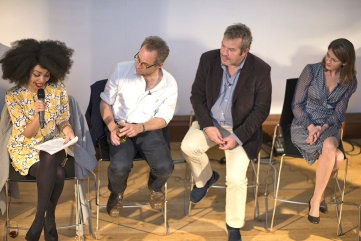
- Environment & ecology
- Governance & investment
- Foreign relations
Dabiri wraps up and The Quiery Brothers play the audience back out into the Anatomy Lecture Theatre to continue drinking and talking.
This was a London event – looking at Ireland, through the Irish, disaporic Irish, Norwegians, Nigerians, Scots and English.
With this project we aimed to create the prototype for All Our Tomorrows – a series of near future scenarios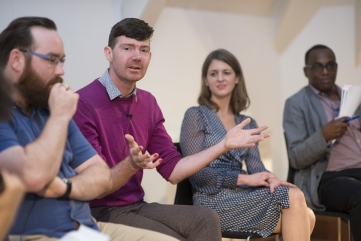 to find new ways and forms to look at contemporary issues; to promote the playwright as a public artist - and operating not solely dependent on theatre productions, but as part of a wider collection of journalists, academics, activists and other artists.
to find new ways and forms to look at contemporary issues; to promote the playwright as a public artist - and operating not solely dependent on theatre productions, but as part of a wider collection of journalists, academics, activists and other artists.
Through this mix, the intention was to immerse the audience in an environment – and in pleasantly discombobulating them, get them to think again, anew.